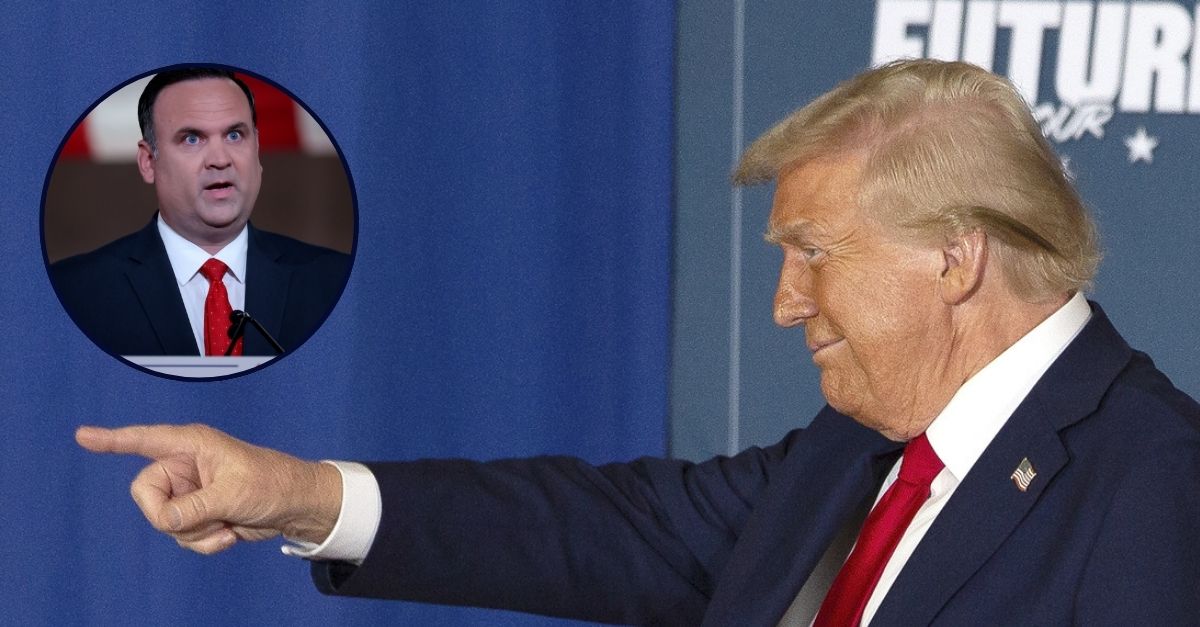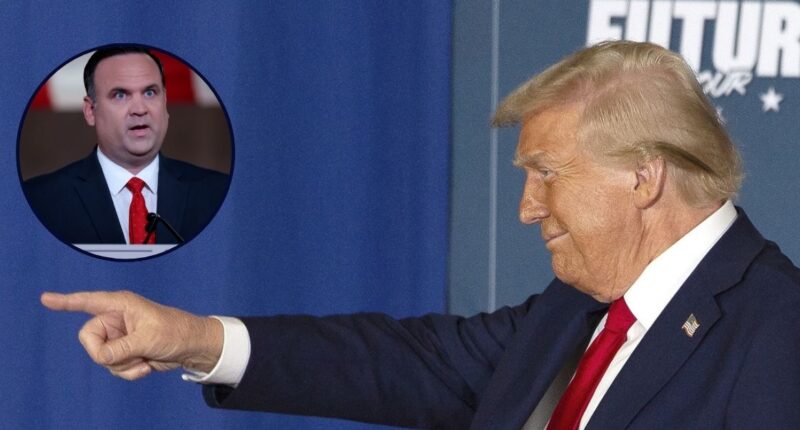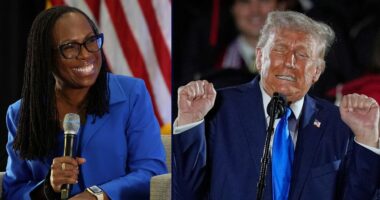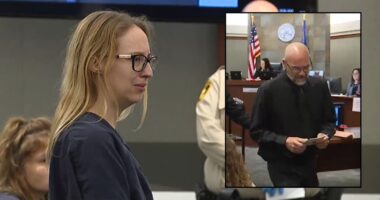
Inset: In a prerecorded address for the Republican National Convention released August 27, 2020, White House Deputy Chief of Staff for Communications Dan Scavino speaks inside the empty Mellon Auditorium August 26, 2020 in Washington, DC. (Photo by Chip Somodevilla/Getty Images). Background: FILE: President-elect Donald Trump attends the Building America’s Future, Southeastern Pennsylvania Roundtable at the Drexelbrook Event Center on October 29, 2024, in Drexel Hill, Pennsylvania (Matt Bishop/imageSPACE/Sipa USA via AP Images).
A state of semi-chaos has erupted in recent days as discovery is set to conclude in a lawsuit filed by police officers and members of Congress in response to the Jan. 6 attack on the U.S. Capitol Complex.
At the center of the procedural storm is President-elect Donald Trump’s former deputy chief of staff and campaign social media director Dan Scavino — and his long-sought-after deposition.
Now, that deposition is scheduled to occur on Tuesday — and a recent court order suggests that a last-minute bid to delay went nowhere.
In the case, Trump’s attorneys were the first to push for Scavino to be deposed. In a September subpoena, the deposition was originally scheduled to occur on Oct. 21, or at an agreed upon time.
Then, the plaintiffs got involved.
In the underlying case, Trump and others are accused of having “conspired to incite an assembled crowd to march upon and enter” the national legislative seat of government that fateful day. The lawsuit is premised on the Ku Klux Klan Act of 1871, a federal law barring mob violence directed at federal officials.
The various plaintiffs allege the defendants are civilly liable for what transpired and seek compensatory damages in the consolidated series of lawsuits. The action stems from a complaint filed by Rep. Bennie Thompson, D-Miss., the former chairman of the now-defunct House Select Committee to Investigate the Jan. 6 Attack on the U.S. Capitol, as well as lead plaintiff Rep. Barbara Lee, D-Calif., Rep. Eric Swalwell, D-Calif. and Capitol Police officers including Conrad Smith, Bobby Tabron, Briana Kirkland, and James Blassingame.
On Oct. 16, the plaintiffs expressed their own interest in what Scavino had to say — alerting Trump’s counsel that they “intended to participate in any such deposition,” according to a recent summary timeline of events from a motion filed in the case.
A few days later, however, Scavino threw a wrench in the works.
His attorney Stanley Woodward apparently took issue with the deposition subpoena(s) — even though the subpoena(s) at that point had only been filed on Trump’s behalf.
“Mr. Scavino’s attorney, Mr. Woodward, responded to Plaintiffs’ counsel via email that he did not accept service of any subpoenas and requested that counsel find a time to discuss the matter,” the plaintiffs’ recent motion reads. “Plaintiffs’ counsel emailed Mr. Woodward and former President Trump’s counsel proposing several times that week when they would be available to meet and confer regarding Mr. Scavino’s deposition.”
Days passed with several attempts communication attempts, the plaintiffs allege. Those efforts were apparently not productive.
On Oct. 28, the plaintiffs hired a process server to attempt their own subpoena in order to obtain Scavino’s deposition.
“Plaintiffs’ counsel Joseph Sellers emailed Mr. Woodward informing him that Plaintiffs were cross-noticing Mr. Scavino’s deposition and attaching a deposition subpoena thereto,” the plaintiffs’ motion goes on. “The email also stated that Plaintiffs had sent a subpoena and witness check to what they understood to be Mr. Scavino’s residential address. The email further asked whether Mr. Woodward would accept service of the attached subpoena on Mr. Scavino’s behalf.”
Fast-forward a month or so. Several attempted — but failed — efforts by the process server to deliver the subpoena notice, as well as some concomitant efforts from the plaintiffs to deal with Scavino’s lawyer and check on the status of the would-be deposition, whooshed by.
On Nov. 27, one of Trump’s attorneys sent an email saying that Scavino’s deposition was finally back in the works.
The plaintiffs’ motion recounts the action that day:
At 4:38 PM, former President Trump’s counsel emailed to Mr. Woodward and Plaintiffs’ counsel a “Notice of Deposition of Daniel J. Scavino,” which stated that the deposition would be conducted via Zoom on December 3, 2024.
At 5:40 PM, Plaintiffs’ counsel Brian Corman emailed the Plaintiffs’ Cross-Notice of Deposition of Mr. Scavino to Mr. Woodward and former President Trump’s counsel.
Three days later, Scavino’s attorney emailed Trump and the plaintiffs — asking for everybody to agree on another 45 days of delay so the court could clarify and cabin any proposed questions, according to the plaintiffs’ motion. Both Trump’s lawyer and the plaintiffs lawyers wrote back in the negative — saying the Dec. 3, deposition should move forward.
The plaintiffs raised the following objection: “Mr. Woodward had waited until the Saturday afternoon before the deposition to raise his request, which would delay the deposition until after the court-ordered deadline for conducting immunity-related fact discovery.”
The deadline for discovery in the case is Dec. 4.
In response, on Monday, Scavino’s attorney filed a motion for a protective order and/or to quash the subpoenas.
Scavino’s motion argued in favor of a schedule that would outline “the scope of what matters any deposition of Mr. Scavino can cover, especially where, as here, neither subpoena addresses the scope of matters that may be covered in Mr. Scavino’s deposition.”
The heart of his argument is that any questions asked “will involve actions taken in his official capacity as Deputy Chief of Staff to then-President Trump” and “will only be for the benefit of an inquiry into President-elect Trump’s motives at the time.”
Scavino says this avenue of inquiry has been “strictly forbidden” by the U.S. Supreme Court in its landmark presidential immunity ruling.
“[A]ssuming the Court agrees Mr. Scavino was acting in his official capacity as Deputy Chief of Staff for all conduct relevant to this litigation, he is therefore immune from inquiry in civil litigation,” the Scavino motion reads. “His deposition is therefore precluded unless and until the question of such immunity can be addressed … these weighty issues of constitutional significance must be resolved prior to Mr. Scavino appearing for any deposition.”
The plaintiffs filed their motion in opposition later on Monday — and an emergency hearing was held that same day.
Perhaps notably, Scavino’s motion says: “Counsel for former President Trump have indicated they take no position on Mr. Scavino’s request.” And, while it is unclear what — if anything — Trump’s side argued for during the hearing, the 45th and 47th president did not file a motion in response to the latest dispute.
But, it appears not to have mattered anyway.
In a terse order issued Monday evening but docketed Tuesday morning, U.S. District Judge Amit P. Mehta denied Scavino’s requests in full.
“Court heard arguments on the interested party Daniel Scavino’s Emergency Motion for Protective Order and/or to Quash and denied the relief requested,” the minute entry reads.
Now, all indications suggest Scavino is slated for a Zoom deposition sometime on Tuesday — with Trump’s lawyers and likely various lawyers for the plaintiffs asking the questions. And, since the court declined to outline the scope, those questions may run the gamut.








